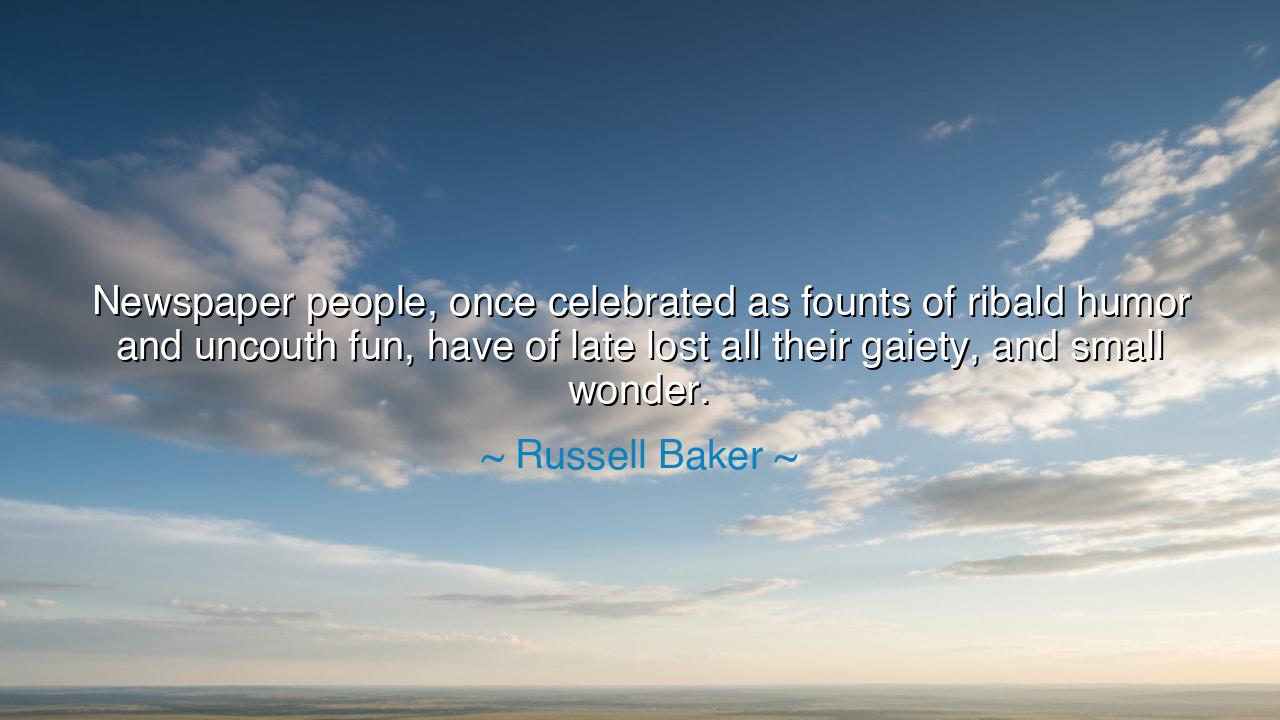
Newspaper people, once celebrated as founts of ribald humor and
Newspaper people, once celebrated as founts of ribald humor and uncouth fun, have of late lost all their gaiety, and small wonder.






Listen, O children of wisdom, for I speak of a truth that reverberates through the very heart of society—a truth that speaks not only of the newspaper and its people, but of the spirit of joy and laughter that nourishes the soul of humanity. In the words of Russell Baker, we hear a lament: "Newspaper people, once celebrated as founts of ribald humor and uncouth fun, have of late lost all their gaiety, and small wonder." These words, though rooted in the world of print, carry a deeper message about the nature of society, about how the very spirit of a people can change when joy is replaced by seriousness, and laughter becomes a distant memory.
In the days of old, humor was seen as one of the most essential qualities of the human experience. It was the fire that burned bright in the hearts of warriors, philosophers, and poets, allowing them to face the trials of life with a lightness of spirit. In the ancient world, comedy was as powerful a force as tragedy, for it allowed the people to laugh in the face of hardship, to see the absurdity of life and find release in laughter. The great Aristophanes, master of Greek comedy, would gather his audience in the theater not only to make them laugh, but to make them think, to challenge the political powers of his day, and to remind them that no matter how serious life became, there was always room for joy. His plays were full of ribald humor, a raw, uncouth expression of the chaos and absurdity of the human condition.
Yet, in Baker’s words, we see a stark contrast. The newspaper people—those once revered as the chroniclers of society, the purveyors of truth, and the bringers of laughter—have lost their gaiety. No longer are they the lively spirits who could turn the absurdity of the world into a source of joy. The shift from humor to seriousness is not just a loss of laughter, but of a profound shift in the way society views itself. When the storytellers, the jokers, the scribes of old, begin to lose their joy, it is a reflection of a society that has become weighed down by its own burdens, by the endless struggles of the day, and by the pressure of unrelenting seriousness.
This shift has its roots deep in the history of mankind. There was a time when news was a celebration of life—stories were told with a sense of purpose, but also with a sense of playfulness. Consider the Renaissance, when artists and writers reveled in the fullness of life, where laughter and lightheartedness were seen as necessary companions to deep thought and intellectual pursuit. Shakespeare, in his comedies, brought the playful and the profound together, showing that the human condition, no matter how tragic, is always intertwined with moments of joy and laughter. But as the world has become more complicated, as the burdens of life have grown heavier, society has lost touch with this essential joy.
Baker’s words serve as a powerful reminder of the dangers of living too seriously. When we allow the weight of the world to dictate our mood, to strip away the joy from our work, we lose the very essence of what makes us human. Laughter is not a luxury, but a necessity. It is through humor that we find release from the heavy chains of life, and it is through playfulness that we remind ourselves that no matter how dire the situation may seem, there is always space for light.
Consider, for a moment, the ancient warriors who, after the fiercest battles, would gather around the fire and laugh together. The very act of laughter, even in the face of death, was a powerful weapon that allowed them to endure the hardships they faced. The great conqueror Alexander the Great, despite the battles he fought and the kingdoms he toppled, is said to have had a keen sense of humor that he used to bring joy and camaraderie to his soldiers. In his laughter, they found strength, for it reminded them that life was more than just battle and strife—it was a tapestry of joy and pain, of seriousness and humor.
The lesson, O children of the future, is one of balance. Do not let the burdens of life steal your gaiety. Let humor be a companion, a strength, and a force that helps you navigate the difficult moments. Whether you are a writer, an artist, a warrior, or a common person, never forget the power of laughter—it is the gift that allows the soul to remain light, to face even the darkest times with courage. And should the world around you lose its joy, be the one to bring it back, for in your laughter lies the power to not only survive but to thrive. The newspaper people may have lost their gaiety, but you, O children, can choose to hold it close, to celebrate life with all its complexity, and to laugh in the face of the absurdity that life so often presents.






AAdministratorAdministrator
Welcome, honored guests. Please leave a comment, we will respond soon